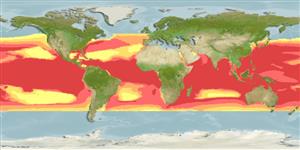Preferred temperature (Ref.
115969): 18.2 - 27.7, mean 25.6 (based on 513 cells).
Phylogenetic diversity index (Ref.
82804): PD
50 = 0.7505 [Uniqueness, from 0.5 = low to 2.0 = high].
Bayesian length-weight: a=0.00589 (0.00276 - 0.01257), b=3.14 (2.94 - 3.34), in cm Total Length, based on LWR estimates for this species & (Sub)family-body (Ref.
93245).
栄養段階 (Ref.
69278): 4.5 ±0.3 se; based on diet studies.
回復力 (Ref.
120179): 低い, 4.5年~14年の倍増期間の最小個体群 (rm=0.11; K=0.4-0.8; tmax=13; Fec=>2M).
Prior r = 0.38, 95% CL = 0.25 - 0.57, Based on 1 full stock assessment.
Fishing Vulnerability (Ref.
59153): Moderate vulnerability (41 of 100).
Climate Vulnerability (Ref.
125649): Moderate to high vulnerability (48 of 100).
